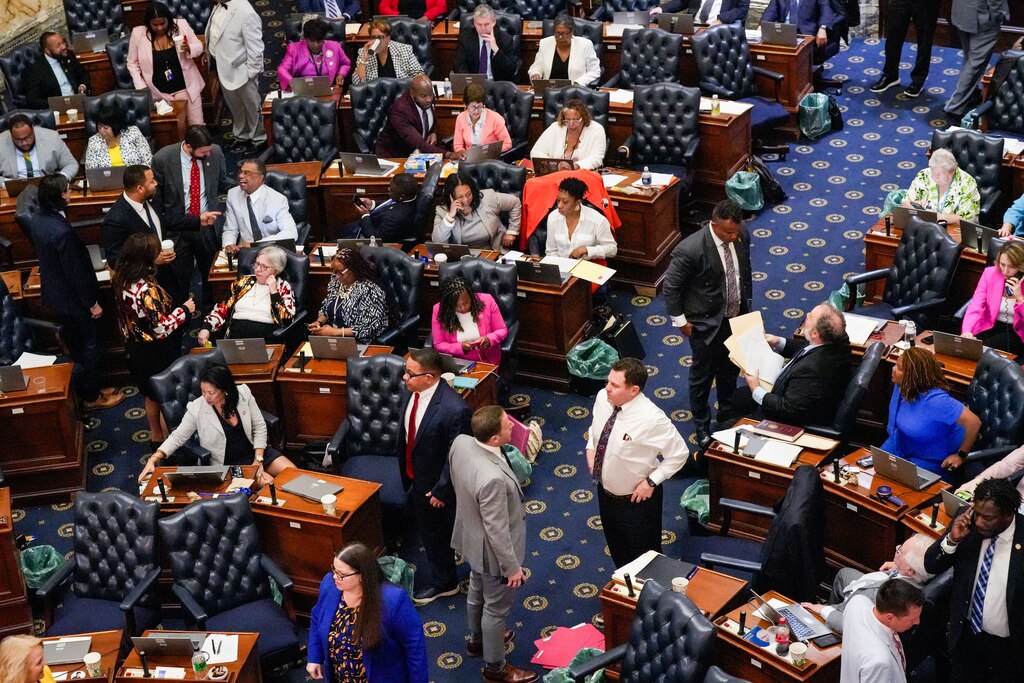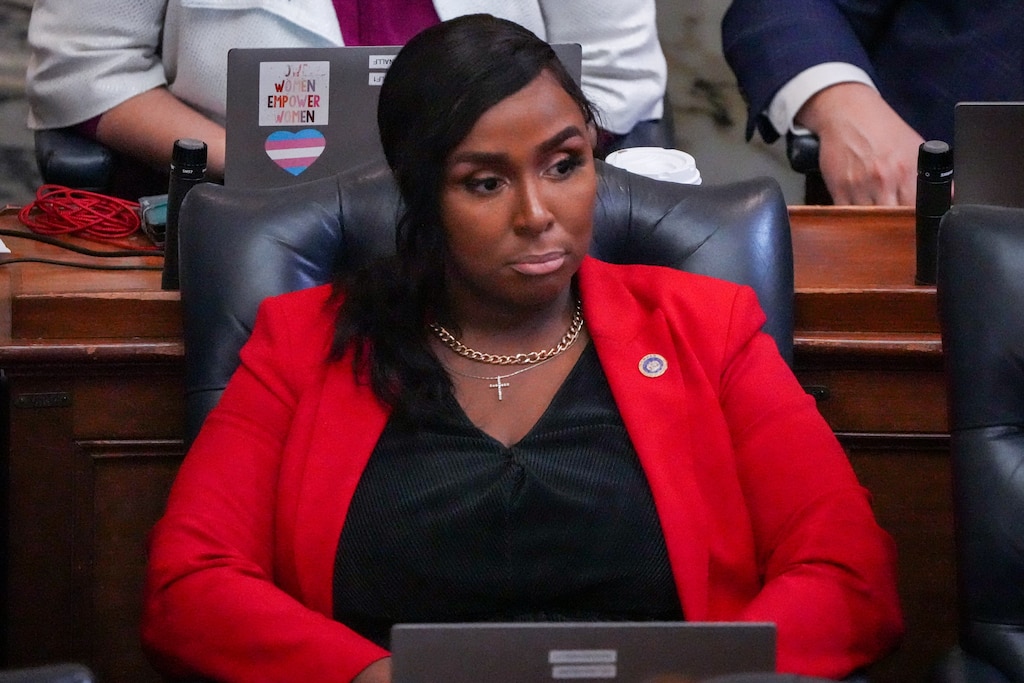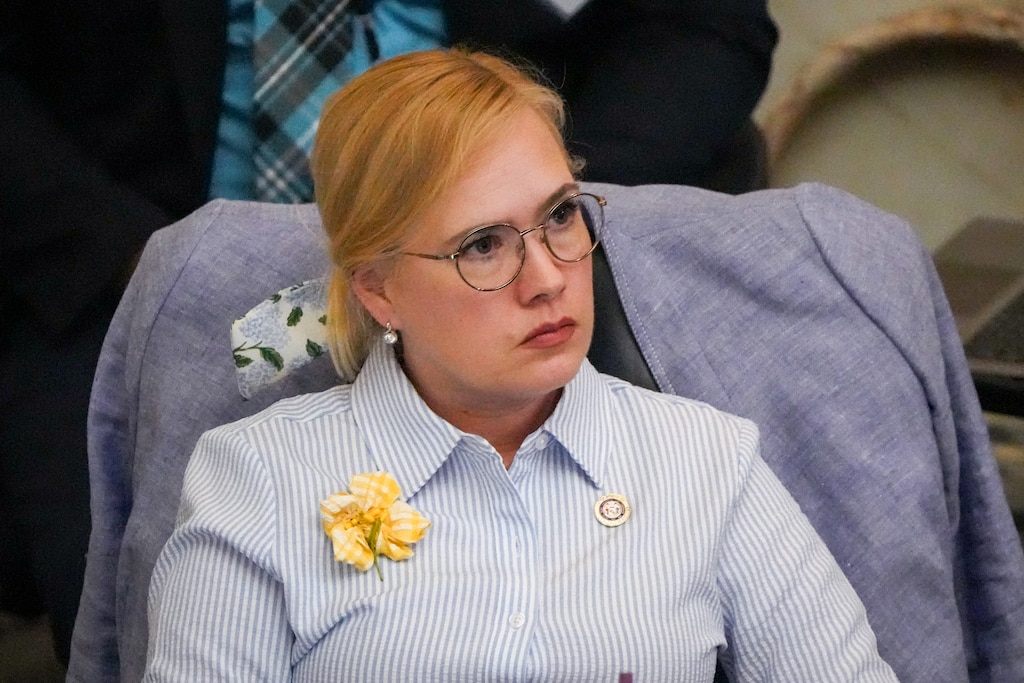The competition for an open state Senate seat in the Annapolis area may rest on the top two contenders’ records on reproductive health and LGBTQIA+ rights.
Dels. Shaneka Henson and Dana Jones are vying for the coveted seat left vacant by Sarah Elfreth, who resigned after winning a seat in Congress. The winner — who will be nominated by the Anne Arundel County Democratic Central Committee on Saturday — will represent the capital city of Annapolis and suburbs that stretch to rural southern Anne Arundel County.
The district includes the reliably Democratic area of Annapolis, as well as more conservative and Republican south county. It’s nearly 70% white, but has an influential Black population and a growing Latino community. If Henson is selected, she’d be the first Black woman to hold the seat and just one of three currently serving in the 47-member Senate.
Neither Henson, nor Jones, who is white, has overtly discussed race in the unusually intense sprint to win over party insiders. Instead, they’re focusing on their legislative records, particularly on LGBTQIA+ protections and reproductive rights.
The Baltimore Banner thanks its sponsors. Become one.
And Henson has found herself explaining an ethics report that faulted her for not disclosing her business relationship with a church that sought state funding.
The incoming Republican-led Congress and President-elect Donald Trump are “absolutely hostile” to reproductive rights and LGBTQIA+ rights, Jones said. She touts her endorsements from well-known Annapolis LGBTQIA+ activists and groups that promote reproductive health care.
“We need the privacy for our health care. We need the ability to have bodily autonomy. We need the ability to be respected for who we love and how we love,” Jones said. “And I think that it’s critical that we have a senator who stands up for the civil rights and health care rights for all of its constituents but also for the state of Maryland.”
Henson, meanwhile, says that she, too, is a champion for health care and the LGBTQIA+ community and defends votes — and nonvotes — in the legislature on those issues. Some of her stances have been misconstrued, she said, and other times she felt legislation had flaws.
“I have many members of my family who are gay, friends who are gay, people who I love deeply who are members of the gay community. And in my personal life, with those folks who I love and who I hold dearly, we love and support each other,” she said. The criticism of her record doesn’t “exist in my personal life,” Henson said.
The Baltimore Banner thanks its sponsors. Become one.

Votes and nonvotes
Central to the Henson-Jones competition is 2024’s Freedom to Read Act, a bill sponsored by Jones that aims to ensure that publicly funded libraries have diverse materials and protect library employees from retaliation.
Both voted for the bill, but Henson has been criticized for what some said was an aggressive line of questioning during a hearing.
Henson asked if a directive in the bill for libraries to provide materials to meet the “interests of all persons” could be interpreted to mean pedophilia or violence? Jones and her assembled experts began to clarify the intent of the bill, but Henson’s questions were cut off by the committee chair. Henson left the hearing soon after.
Jones said in an interview that there was “some very unfortunate questioning about the bill,” but did not mention Henson specifically.
On social media, though, Henson’s questions were compared to the rhetoric of Moms For Liberty, a conservative group known for their attempts to ban and restrict books. One critic wrote: “Thanks for showing your true colors Shaneka. Now it’s my turn bitch.”
The Baltimore Banner thanks its sponsors. Become one.
In an interview, Henson said her questions have been misunderstood or misconstrued, perhaps purposefully.
“I am very sorry that that was the response that came from the community, and that anyone thought I was targeting them or their life or who they choose to love. That was never in the nature of my questions,” Henson said.
Henson did not vote on two bills aimed at helping patients seeking gender-affirming care and their medical providers, or on proposed amendments to those bills. Henson was present on the days when the House of Delegates voted on the Trans Health Equity Act in 2023 and a provider protection bill in 2024, but did not vote on proposed amendments or the final bills. She was not excused from any of the votes.
House of Delegates rules require delegates to vote when they’re in the chamber; they’re often reminded by leaders to cast their votes.
Henson said that the nonvote on the provider protection bill was an oversight. “I fully support the policy expressed in the bill,” she wrote in an email.
The Baltimore Banner thanks its sponsors. Become one.
As for the Trans Health Equity Act — which requires the Medicaid insurance program to cover more types of gender-affirming care — Henson said she had reservations about children receiving gender-affirming care.
Because she wasn’t fully opposed to the bill, but couldn’t fully support it, either, Henson said she relied on the counsel of Democratic leaders and opted not to vote.
“There’s a different implication to say ‘no’ versus saying, ‘I don’t have enough information to say yes,’” Henson said.

Jones, who voted for both bills, takes issue with taking a pass on voting.
“No matter how hot that seat is on the floor, you don’t get up and walk out. Because that’s not what the job calls for,” Jones said.
The Baltimore Banner thanks its sponsors. Become one.
For her part, Henson said she’s voted for other bills supporting LGBTQIA+ Marylanders, including creating a state commission and repealing the so-called “gay panic defense” that allowed criminal defendants to blame victims for being gay.
But Henson’s actions prompted 11 prominent LGBTQIA+ activists in Annapolis to sign a letter throwing their support behind Jones.
“Dana’s work with and support for the LGBTQ+ community makes me confident she will represent everyone, including other marginalized or minority communities,” one of those advocates, Joe Toolan, said in a statement.
Reproductive health care has also been a theme in the campaign. Jones touts her endorsements from the political arm of Planned Parenthood of Maryland and Reproductive Justice Maryland.
Henson voted against the Abortion Care Access Act in 2022, which required better insurance coverage for abortions, funded training for medical providers and expanded the providers who can perform the care to include professionals such as nurse practitioners and physician’s assistants. When then-Gov. Larry Hogan vetoed the bill, Henson voted to sustain the veto while the majority of Democrats successfully overturned it.
The Baltimore Banner thanks its sponsors. Become one.
Henson said she had concerns about nonphysicians providing abortion care and questioned whether women of color and low-income women might be more likely to receive care from nonphysicians.
Looking back, Henson said she might have voted for the bill if it had more protections. For example, if it allowed nonphysicians to only offer medication-induced abortion, and not abortion procedures.
“Our bill simply opens the door, creating additional risk,” she said, “and it is my whole-hearted belief and fear and worst nightmare that Black women are going to once again be the people who can least afford absorbing that risk.”
Both delegates supported letting voters decide on enshrining reproductive choice in the state constitution, a measure that passed overwhelmingly in the fall general election.
Henson: Her ‘work inspires progress’

Henson said her lived experiences inform her work as an elected official.
She grew up in Annapolis as the daughter of pastors, accustomed to doing service work to help others, but found herself on the receiving end of help when she became pregnant as a 19-year-old college student.
As a young woman raising her child, she lived in public housing and relied on community support. She was able to continue her education, earned a law degree and began advocating for people in her old community.
Eventually, Henson was nudged into politics and won a seat on the Annapolis City Council in 2017. She was appointed to the House of Delegates in 2019 following the death of then-House Speaker Michael E. Busch, a revered figure in Annapolis Democratic politics. Busch’s wife, Cindy Busch, is among Henson’s supporters for the Senate seat.
So is Sen. Cory McCray, a Democrat from Baltimore. He worked with Henson on a bill to help HBCU graduates enroll in the state’s law schools.
“Shaneka is not just a colleague or thought partner — she is a trailblazer whose work inspires progress,” McCray said in a statement. “Because of her vision and dedication, I am a better leader, and our legislature is stronger for it.”
Henson said her priorities in the Senate would be the issues she’s worked on in the House: maternal health, renter protections and affordable child care. Henson notes she’s worked to provide more support to pregnant and parenting college students and to create a work group to recommend standards for mold in rental housing, among her accomplishments.
But her tenure in the House also includes an ethics investigation in which she was directed to apologize for not recusing herself from voting on state funding for an arm of a church, Kingdom Celebration Center, that had hired her to do legal work.
Henson never disclosed her business relationship with the church, even when asked directly by House Speaker Adrienne A. Jones and her staff, according to the ethics report.
Henson chalks the matter up to a “communications issue.” She said she’s not concerned that it may hinder her chances for Senate.
“I definitely took every lesson I could from the report and I’ve incorporated it into the way I move forward,” Henson said.
Jones: Strategist to legislator

Jones, who is white, grew up in Cumberland in a family of Democrats and union workers.
After graduating from Towson University, Jones built a career working behind the scenes in politics, including as a senior researcher for the Democratic Congressional Campaign Committee, as a senior staffer at Emily’s List and as a political consultant. Early in her career, Jones worked for U.S. Sen. Ben Cardin, back when he was in the House of Representatives.
Like Henson, Jones first ended up in the House of Delegates by appointment in 2020 after a delegate resigned and she was encouraged to apply.
Jones said she has put her behind-the-scenes and strategic knowledge to work to advance her own priorities and help fellow Democrats.
Freedom to Read has been the bill that’s drawn the most attention, but Jones said she has passed about two dozen others, including measures to exempt diapers and baby necessities from the sales tax, to allow a tax break for donating to diaper banks and to study how to improve emergency notifications for boaters and others on the water.
Jones took officeduring the early days of the pandemic, and being out in the community — seeing parents who needed not just food, but also diapers — inspired some of her efforts.
Jones describes herself as a team player, willing to put her campaign know-how — and her campaign war chest — to work to help other candidates and causes.
Decision day

Also in the running is Robert James Leonard, a retiree from Deale who is active in the South County Democratic Club.
Leonard said he won’t run for the seat in 2026, freeing him to vote his conscience without worrying about campaign consequences.
Leonard questioned the appointment process that leaves out the will of voters. “I don’t think a small group of people, no matter how open and transparent the process is, should anoint someone with incumbency,” he said.
All three will be interviewed publicly Saturday by the 20 central committee members, who will then deliberate behind closed doors before a public vote.
The winner’s name will be forwarded to Gov. Wes Moore, who has the final say .





Comments
Welcome to The Banner's subscriber-only commenting community. Please review our community guidelines.